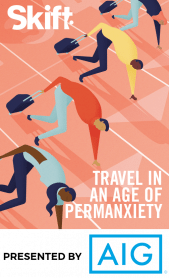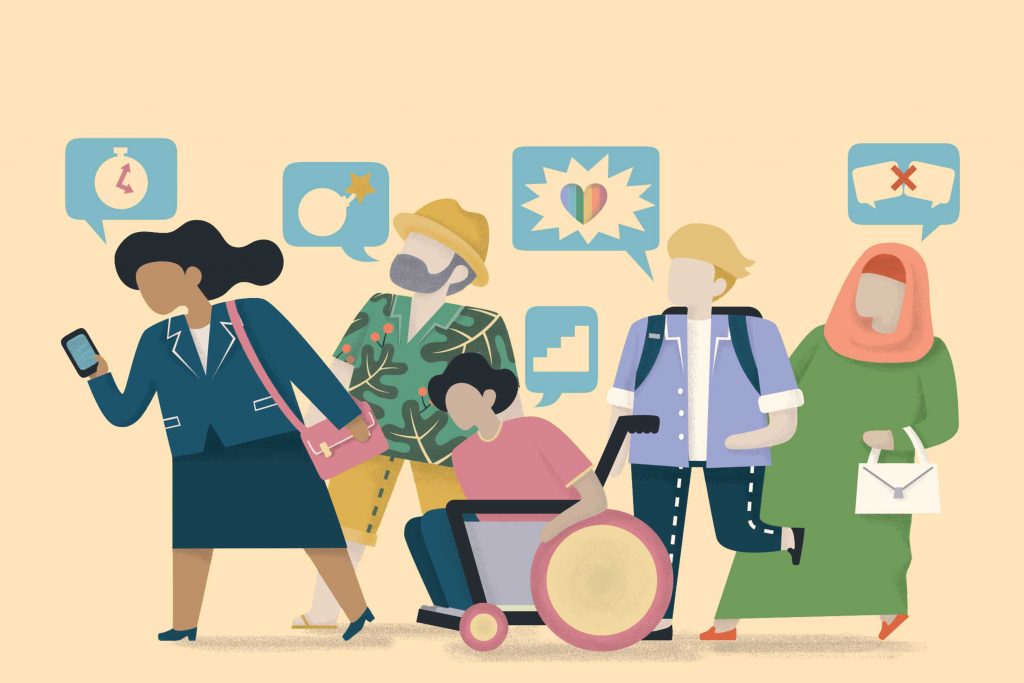Skift Take
"I am this guy. I fit every cliché; I am the abstract villain of your imagined anxieties. Traveling while Muslim."
 Editor’s Note: Last month at Skift Global Forum we introduced Permanxiety, a term we’re using to describe the current state of the traveler and the consumer mindset as a result of these global and local anxieties. As part of that, we included first person essays on travelers’ permanxieties, in order to better understand what we think about when we visit an airport, check in to a hotel, or visit a new destination.
Editor’s Note: Last month at Skift Global Forum we introduced Permanxiety, a term we’re using to describe the current state of the traveler and the consumer mindset as a result of these global and local anxieties. As part of that, we included first person essays on travelers’ permanxieties, in order to better understand what we think about when we visit an airport, check in to a hotel, or visit a new destination.
These are similar to conversations that many of us have with friends or family, as well as how we think about things in our own heads. No matter your background, we think you’ll recognize something in these stories from your own experience. This first essay below is by Skift CEO and Founder Rafat Ali, on his experience through the years of living and traveling in post 9-11 America and outside of it.
THE demons in my head are real. They are real because they have been created over more than a decade and a half, bit by bit, indignity by indignity, layers upon layers of wounds big and small that have now calcified into my overanxious brain.
That is how I live it, a Muslim American immigrant, an apparent success story of the fabled American Dream, an entrepreneur and business owner and the CEO of Skift, a company that lives and breathes travel every waking hour.
In an age of permanxiety, as Skift has defined it in the opening essay, the anxieties of a Muslim traveler are a sociological condition I carry with me all the time. And it doesn’t stop there: My mere presence causes anxiety for other people during travel. Recently, Royal Jordanian Airlines came out with a powerful ad that mirrors many of these worries. The minute-long ad “Are you afraid of flying?” goes like this:
“I’m not afraid of flying… I’m not afraid of the risk of it. I’m afraid I end up somewhere I don’t want to go. Afraid of being stuck in a place with people who look at me differently. I’m afraid of the what-ifs. What if something wrong happens and they don’t believe me…?”
I am this guy. I fit every cliché; I am the abstract villain of your imagined anxieties.
Traveling while Muslim. Doesn’t matter if you are practicing or not. Or you wear visible signs of being Muslim. There are dozens and dozens of permutations of typecasting us, and they all play out every day. Most of all, they settle down in our brains and play havoc while we travel.
Lots has been reported and written about the challenges regular Muslim travelers have had to endure since the day that 19 religious zealots who blamed their hatred on my religion changed the U.S. forever. But like pretty much everything else in
media, the exploration has been mostly cosmetic, helicopter reporting by reporters (read: not Muslims) who get a few quotes out of us when some major incident happens and then package it up, tie it in a bow and that’s it. That’s where it stops. But American Muslim travelers themselves have rarely written about the mental cost that the last
15 or so years have brought on us, especially while traveling.
The security theater that passes for an attempt to secure the country is a theater that mostly plays out in our minds. Anxiety is the heaviest luggage we carry when we travel, nevermind whether anything actually happens or not.
“Paxex” is industry jargon short for “passenger experience” in the aviation world, usually used in the context of amenities: airport restaurants, in-flight Wi-Fi, seat comfort and such. No one ever talks about soothing the passengers’ minds as part of the paxex world — it is instead limited by “amenities.” Mostly because the ones defining or writing about it have never had to travel in an overanxious Muslim state of mind.
It starts long before you ever reach the airport. When you hesitate before booking an occasional one-way ticket, especially last-minute, worried your Muslim name may trigger
a red flag in the security-industrial complex somewhere.
Worrying about packing a Quran or prayer rug or even an Arabic language book in your bag in case those are checked and misconstrued by immigration.
When you try and check in online and the message comes back: “Sorry we’re unable to process your check-in online, please check with the ticket agent at the airport.” This could be just an innocent technical error in the airline IT system, but it somehow lands in our minds as something else entirely. Yep, that darned Muslim name of ours has triggered a flag requiring an extra manual check at the airport.
It continues at the check-in counter at the airport, where the same thing may happen at the automated check-in machines and an agent has to check you in manually on her computer. Or when she stares intently into her computer, calls a supervisor, who then keys in a few more steps, adding extra minutes that keep the mind working through
various scenarios of what they could be checking for or what could have gone wrong.
You always wonder what the ticket or TSA agent scribbles on your boarding pass, passing secret codes to the other agents down the line to give you extra scrutiny.
Like I said, both real and imagined demons of the overactive and overanxious mind.
This mental game continues at the passport check line, where the TSA agent looks you over a couple of seconds longer than others in front of you. Or maybe it didn’t happen but it felt like that to you. Then comes the security where you take off everything along with your dignity, and you voluntarily walk over to the larger scan machine because you know you will never ever be waved over to the more innocent old-school metal detector next to it that others may get a chance to go through, even if you’re with a toddler who
needs his hand held.
The relief when you get through security then triggers a WhatsApp text back to your family: “I made it through security. Everything OK.” These texts to family and spouses are the delicate lifelines we hang onto during the whole airport experience through departure and arrival.
Then the boarding gate, where sometimes you imagine stares from travelers, worried whether they think we’re fidgeting too much. Or when you make that call to your family and suppress saying the traditional Muslim (Arabic) greeting “Salam walaikum” too loud into the phone, worrying that if anyone hears it they might raise an alarm.
A Muslim in our midst! In any other world this would be extreme paranoia of our own minds, but in the world we live in today, these incidents happen, fellow travelers freaking out over people talking in Arabic or uttering even a greeting. So we stick to hellos at the airports and last-minute “I’m boarded” calls.
Immigration checks on arrival are permanxiety nirvana for us Muslims, but even more so since the Trump administration came in. The Trump travel ban and mysterious Global Entry snafus for Muslim travelers. The laptop ban, which is not a ban but enhanced interrogation nonetheless, the social media checks for passengers from certain countries (and maybe even American Muslim citizens), it all lands hard. This is what makes you go through somewhat ridiculous lengths to “suppress” chances of being discriminated against, like carrying burner phones and laptops during your travel, as I have been doing this year.
(Independent UK even did a story on me about this earlier this year.)
It means worrying when you have to travel to the Middle East or other “problem” areas for work, for leisure, or for family, and being questioned about it at immigration counters.
Beyond the air experience, booking at hotels is less fraught with issues of permanxiety. Hotels in general are structured to soothe the anxieties of travelers, but it isn’t always so. With Airbnb and the rise of alternative accommodations, a new layer has been added: instances of racism and discrimination from hosts against people of color or different
religions or nationalities. Ever since instant booking (i.e. listings that don’t require approval from the host before they can be booked, basically how hotel bookings work) became a feature on Airbnb and HomeAway, Muslims like me just gravitate toward it over and above any other options, mainly to never have to face a situation of real or perceived discrimination in the first place.
Then the destinations you go to, depending on how open those societies are to differences, create differing levels of anxiety in you. Travel guidebooks write about how friendly a particular country is, but forget to add the unsaid caveat: that traveling
while white — in most cases guidebook authors are white — is very different than traveling as a person of color. Or Muslim.
The discrimination that immigrants living in Western countries face also shows up for Muslim travelers in these countries and regions, and if you are a seasoned traveler, you find ways around them, or avoid these places altogether. Many American Muslims I know have a mental barrier to traveling in the American South, especially the Deep South,
and when our American friends take a cross-country trip, we worry about the parts that may not be as friendly to drive through to us as Muslims as they may be to others. Hence it never figures in our plans, fairly or unfairly.
This is the permanent sociological condition we Muslims travel with, the permanxiety baggage that we carry.
The Daily Newsletter
Our daily coverage of the global travel industry. Written by editors and analysts from across Skift’s brands.
Have a confidential tip for Skift? Get in touch
Tags: muslim, permanxiety, sgf2017, skift global forum
Photo credit: Muslim travelers face a dizzying array of anxieties while traveling. Bing Qing Ye / Skift
